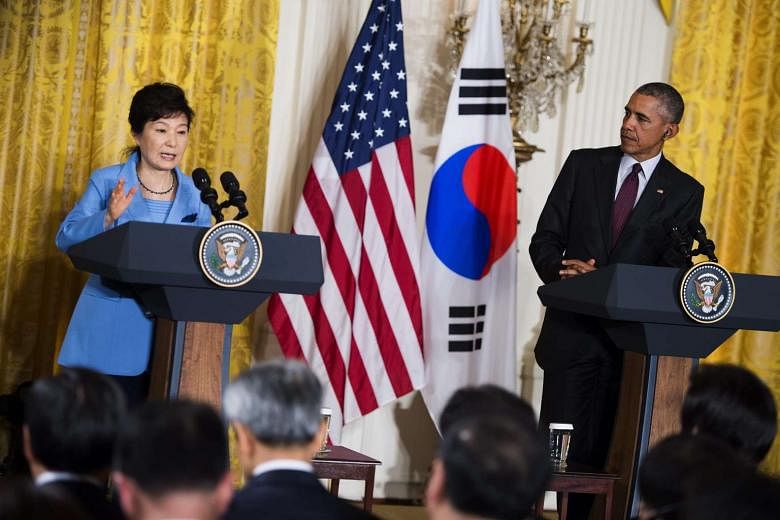WASHINGTON (AFP) - US President Barack Obama and his South Korean counterpart stressed their readiness to "engage" nuclear-armed North Korea on Friday (Oct 16), albeit with conditions.
Hailing the Washington-Seoul alliance as the "lynchpin" of security on the Korean Peninsula, Obama welcomed Park Geun-Hye to the White House and said his nuclear deal with Iran carried lessons for Northeast Asia.
If Pyongyang is willing to curb nuclear and missile programmes that have "achieved nothing except to deepen North Korea's isolation," Obama said, "I think it's fair to say we will be right there at the table."
His comments came during a South Korea visit that was designed to underscore close ties as South Korea also deepens relations with China.
Park won a significant diplomatic victory when Obama "welcomed" her Northeast Asia Peace and Cooperation Initiative, designed to rekindle talks with Kim Jong-Un's bellicose government.
The regional forum - including North and South Korea, the United States, Japan, China, Russia and Mongolia - is seen by Seoul as a way to bolster regional cooperation and keep much-constricted diplomatic channels open with its bellicose nuclear-armed neighbor.
The White House said Obama had tasked senior diplomat Sung Kim to work on the project.
Senior South Korean officials privately acknowledge a decade of US-led stop-start "six party" talks to dismantle North Korea's nuclear program are all but dead.
North Korea has conducted three nuclear tests and threatened a fourth as part of a weapons and missile program that it has pursued through a barrage of international sanctions.
The secretive country has long claimed it has technology capable of launching nuclear bombs at its distant enemies, but experts are skeptical whether it has acquired the sophisticated expertise needed to produce such weapons.
Park said that North Korea and its young leader needed to display "genuine willingness" to give up its nuclear programme.
"North Korea has to come to its own conclusion that it is genuinely willing to give up nuclear capabilities and become a full-fledged member of international society," she added.
TREATY ALLIANCE
Both Obama and Park were eager to stress that the US-South Korea alliance, forged from the embers of World War II, remains vital for both countries.
Obama dismissed suggestions that Park's ever deeper ties with China threatened US interests.
"Sometimes there's a perception that if President Park meets with President Xi (Jinping) that causes a problem for us," Obama said in an East Room press conference.
Obama joked that just a few weeks ago Xi "was in this room, eating my food and we were toasting and having a lengthy conversation."
"We want South Korea to have a strong relationship with China, just as we want to have a strong relationship with China. We want to see China's peaceful rise."
Park and Chinese President Xi have met six times - most recently last month when she was the most prominent leader of a US-allied nation to attend China's giant World War II anniversary military parade.
On the eve of the White House meeting, Park sought to allay US fears about poor relations with another of Washington's allies - Japan.
Park told a Washington audience she was ready to hold a first formal meeting with Japanese Prime Minister Shinzo Abe, following a string over disagreements over the legacy of World War II.
Park also signalLed her willingness to eventually join a US-led trans-Pacific free-trade deal.

